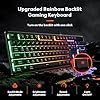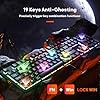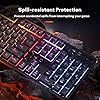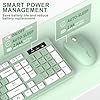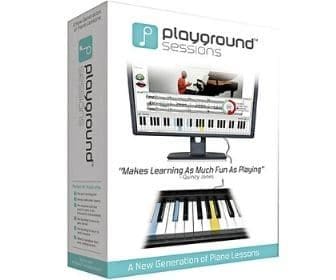Table of Contents
Introduction to Learning Piano as an Adult
Deciding to learn the piano as an adult can be a fulfilling yet daunting decision. Many adults are drawn to the piano for its expressive capacity and the personal satisfaction of mastering a new skill. However, adult learners face unique challenges compared to their younger counterparts, such as managing learning expectations and dealing with the physical constraints of age. This introduction explores the initial considerations and motivates why overcoming these challenges not only improves skill but also enhances overall enjoyment and self-fulfillment.
Finding Time for Piano Practice in a Busy Schedule
As adults, finding consistent time for piano practice can be challenging due to work commitments, family responsibilities, and social obligations. Here’s how you can integrate piano practice into a busy schedule:
Redragon K521 Upgrade Rainbow LED Gaming Keyboard, 104 Keys Wired Mechanical Feeling Keyboard with Multimedia Keys, One-Touch Backlit, Anti-Ghosting, Compatible with PC, Mac, PS4/5, Xbox
20% OffTECKNET Gaming Keyboard, USB Wired Computer Keyboard, 15-Zone RGB Illumination, IP32 Water Resistance, 25 Anti-ghosting Keys, All-Metal Panel (Whisper Quiet Gaming Switch)
25% OffWireless Keyboard and Mouse Combo, Full-Sized Wireless Keyboard and Adjustable DPI Mouse, 2.4GHz USB Receiver, Silent Keyboard and Mouse for PC, Windows, MAC, Desktop, Laptop (Avocado Green)
30% OffRedragon Mechanical Gaming Keyboard Wired, 11 Programmable Backlit Modes, Hot-Swappable Red Switch, Anti-Ghosting, Double-Shot PBT Keycaps, Light Up Keyboard for PC Mac
29% OffStart by setting realistic and achievable practice goals. Rather than aim for lengthy sessions, focus on shorter, more frequent practices that can easily fit into your daily routine. For instance, a 15-minute session every morning before starting your day or during a lunch break can be more practical and less daunting than planning for an uninterrupted hour.
Just like any important appointment, schedule your practice sessions in your calendar. Whether it’s early in the morning, during lunch, or late at night, find a time slot that interferes least with your primary responsibilities and treat it as a fixed appointment. Consistency is key, so try to stick to the same time each day to establish a routine.
Weekends or days off can provide greater flexibility for longer practice sessions. Exploit these times for more extensive training and experimentation on the piano. Moreover, off-peak hours such as early mornings or late evenings might offer quieter and more productive intervals for practice, especially if you wish to avoid distractions.
Focus on the quality of your practice rather than the quantity. Use available time to concentrate on specific skills or pieces you find challenging. Efficient, targeted practice can be more beneficial than longer, unfocused sessions.
RockJam 61 Key Keyboard Piano Stand With Pitch Bend Kit, Piano Bench, Headphones, Simply Piano App & Keynote Stickers
$129.99 (as of January 10, 2026 08:39 GMT -08:00 - More infoProduct prices and availability are accurate as of the date/time indicated and are subject to change. Any price and availability information displayed on [relevant Amazon Site(s), as applicable] at the time of purchase will apply to the purchase of this product.)RockJam 49 Key Keyboard Piano,Sheet Music Stand, Piano Note Stickers & Simply Piano Lessons
37% OffV70 Piano Keyboard 88 Keys Weight Keyboard: TERENCE Keyboard Piano Foldable 88-Key Weight Keyboard Full Size Digital Piano with Headphones 4 Speakers Bluetooth Built-in Battery
$699.99 (as of January 10, 2026 01:06 GMT -08:00 - More infoProduct prices and availability are accurate as of the date/time indicated and are subject to change. Any price and availability information displayed on [relevant Amazon Site(s), as applicable] at the time of purchase will apply to the purchase of this product.)Piano Star
$0.00 (as of January 10, 2026 01:06 GMT -08:00 - More infoProduct prices and availability are accurate as of the date/time indicated and are subject to change. Any price and availability information displayed on [relevant Amazon Site(s), as applicable] at the time of purchase will apply to the purchase of this product.)Consider investing in a portable keyboard or pianist apps that allow you to practice without needing a full-sized piano. These can be particularly useful when traveling or when space and noise are constraints in practicing at home. This adaptability allows for practice in various environments without substantial compromises.
Merge piano practice with other activities. For example, you can revise theory, listen to piano music, or mentally rehearse pieces while commuting, during a break, or while exercising. This form of passive practice helps keep your learning continuous and can enhance your playing skills.
Addressing the Physical Challenges of Adult Learners
As adults age, finger dexterity and agility may not be as sharp compared to younger individuals. However, this can be improved through targeted exercises. Activities such as Hanons exercises, scales, and arpeggios help improve finger strength and coordination. Consistent daily practice, even if only for a short duration, can yield significant improvements over time.
Some adults may worry about having larger or smaller hands which may affect their ability to play the piano. Fortunately, there are various techniques and adjustments that can be made. For instance, for those with smaller hands, focusing on hands-together practice gradually builds stretch and reach ability. Adults with larger hands can practice economizing hand movement and forming correct hand positioning to avoid unnecessary strain.
Joint stiffness or arthritis can be a significant issue for adult learners. It’s essential to adopt a piano technique that emphasizes relaxed hand and wrist movements. Regular breaks during practice sessions and incorporating gentle hand stretches can also help alleviate discomfort. Moreover, it might be helpful to consult a physical therapist for individualized exercises that support piano practice without exacerbating joint issues.
Proper posture is critical to prevent back, neck, and shoulder strain. Adult learners should invest in an adjustable piano bench and ensure their piano or keyboard is at an appropriate height. Sitting at the correct height with feet flat on the ground and maintaining a straight back can prevent long-term injuries and enhance playing comfort. Use a mirror or record yourself to self-correct your posture periodically.
For adult learners, developing muscle memory might take more time. To facilitate this process, it is helpful to practice slowly and gradually increase speed only when accuracy is maintained. Repetition and consistent practice routines are key. Additionally, breaks are necessary to prevent mental and physical fatigue which can hinder learning and retention.
Coordination between both hands can be a challenging aspect, especially for new adult learners. Starting with simple scales and pieces that require minimal hand overlap can help build confidence in hand independence. Teachers often recommend breaking down pieces into manageable sections and practicing hands separately before combining them.
Staying Patient and Motivated Through the Learning Process
Learning piano as an adult can be a fulfilling yet challenging journey. To ensure continued progress, it is essential to stay patient and motivated throughout the process. Here are some strategies to help maintain your enthusiasm and persistence:
Choosing Adult-Friendly Beginner Piano Books
When selecting piano books designed for adult beginners, it’s important to consider materials that cater to mature learning styles and schedules. Adult learners often benefit from books that incorporate explanations of music theory, offer a variety of music styles, and provide flexibility for self-directed learning. Here are some top recommended books:
Remember to consider your individual learning preferences when choosing a book. Whether you thrive on detailed explanations, diverse genres, or multi-sensory approaches, there’s likely a piano book perfect for your adult learning journey.
Connecting with Other Adult Learners for Support
Learning a new skill like piano can be a solo journey, but connecting with other learners can provide a wealth of support and motivation. Here are several ways adult learners can connect with each other:
Online Forums and Social Media Groups
Platforms such as Reddit, Facebook, and dedicated piano learning websites host vibrant communities where adult piano learners can share their experiences, challenges, and triumphs. Join these groups to ask questions, get feedback, and participate in discussions. Regular interaction can also lead to forming study groups or finding practice partners who are at a similar learning stage.
Adult Piano Classes and Workshops
Many music schools and community centers offer piano classes specifically for adults. Being in a classroom setting with other learners provides direct interaction and real-time feedback from both instructors and peers. Additionally, workshops can be incredibly beneficial for acquiring new techniques and receiving support in a focused, communal environment.
Virtual Meetups and Webinars
The rise of virtual meeting platforms like Zoom has made it easier for adult learners to connect, regardless of geographic barriers. Look for virtual meetups, webinars, and online masterclasses that allow participants to learn from experienced musicians and discuss various aspects of piano learning.
Local Music Events and Performances
Attending local concerts, recitals, and music-related events can provide an opportunity to meet other music enthusiasts and adult learners. These gatherings often foster a supportive community environment where individuals can share insights and encourage each other’s progress.
Piano Learning Apps and Online Courses
Many piano learning apps and online courses offer community features where users can connect. These platforms often have built-in forums or social media integrations that make it easy to communicate with fellow learners, share milestones, and even compete in friendly contests.
Conclusion
Learning piano as an adult is a rewarding journey that comes with its own set of challenges. By staying committed, being patient with oneself, and leveraging the right resources, adults can overcome these obstacles. Embracing a positive mindset and focusing on continuous improvement allow adult learners to not only achieve musical proficiency but also gain immense personal satisfaction.


